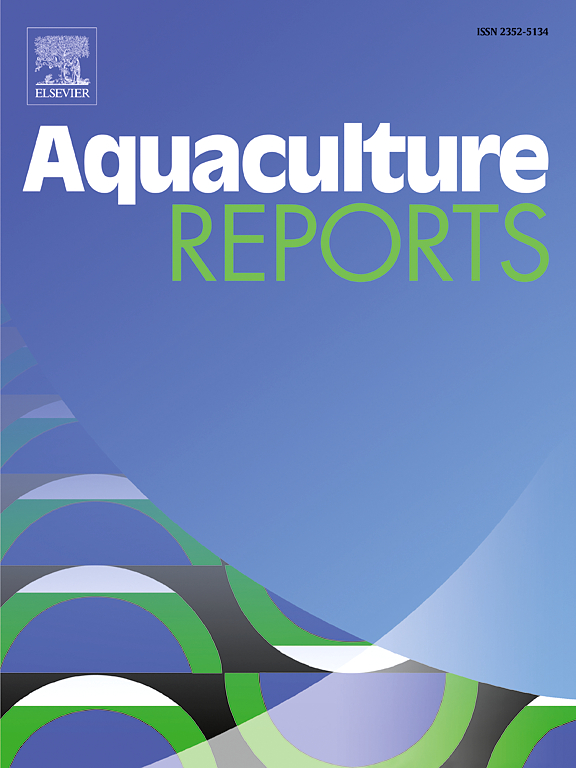Ameliorative effects of lycopene on oxidized fish oil-induced growth reduction and hepatic oxidative alterations of Jinhu grouper (Epinephelus fuscoguttatus ♀ × Epinephelus tukula ♂)
IF 3.7
2区 农林科学
Q1 FISHERIES
引用次数: 0
Abstract
This study investigated the effects of adding lycopene to oxidized fish oil diets on the growth and liver health in Jinhu grouper (Epinephelus fuscoguttatus ♀ × Epinephelus tukula ♂). Fish were fed one of five diets for 8-weeks: (1) FFO: 9 % fresh fish oil (control); (2) OFO: 6 % fresh fish oil and 3 % oxidized fish oil (negative control); (3) LYC1-LYC3: OFO diet supplemented with lycopene (200, 400, 600 mg/kg, respectively). The results showed that the growth performance and whole body crude lipid content were significantly higher in the FFO and LYC groups compared to the OFO group (P < 0.05). Whole body crude lipid was highest in the LYC2 group. In serum biochemical indicators, high-density lipoprotein cholesterol (HDL-C) levels were significantly higher and low-density lipoprotein cholesterol (LDL-C) levels significantly lower in the FFO and LYC2 groups versus the OFO group (P < 0.05). In hepatic antioxidant enzymes, the activities of superoxide dismutase (SOD), catalase (CAT), and glutathione peroxidase (GPx) were significantly elevated in the FFO and LYC groups compared to the OFO group (P < 0.05). CAT activity was highest in the LYC2 group. In hepatic antioxidant-related and immune-related gene, LYC groups significantly upregulated the sod, cat, gpx genes and down-regulated the pro-inflammatory factors interleukin-1β (il-1β), interleukin-8 (il-8), and tumor necrosis factor-α (tnf-α) compared to the OFO group (P < 0.05). Conclusion: Dietary lycopene effectively attenuated oxidized fish oil-induced oxidative stress and inflammation in grouper by modulating hepatic antioxidant and immune-related gene expression. Under the experimental conditions, 400 mg/kg lycopene (LYC2 group) demonstrated the optimal protective efficacy.
番茄红素对氧化鱼油诱导的金湖石斑鱼(Epinephelus fuscoguttatus♀× Epinephelus tukula♂)生长抑制和肝脏氧化改变的改善作用
本试验研究了氧化鱼油饲料中添加番茄红素对金湖石斑鱼(Epinephelus fuscoguttatus♀× Epinephelus tukula♂)生长和肝脏健康的影响。饲喂5种饲料中的一种,为期8周:(1)FFO: 9 %新鲜鱼油(对照);(2) OFO: 6 %新鲜鱼油和3 %氧化鱼油(阴性对照);(3) LYC1-LYC3:分别添加200、400、600 mg/kg番茄红素的OFO饲粮。结果表明:与OFO组相比,FFO组和LYC组的生长性能和全鱼粗脂肪含量显著提高(P <; 0.05)。LYC2组全鱼粗脂含量最高。血清生化指标方面,FFO和LYC2组高密度脂蛋白胆固醇(HDL-C)水平显著高于OFO组,低密度脂蛋白胆固醇(LDL-C)水平显著低于OFO组(P <; 0.05)。肝脏抗氧化酶方面,与OFO组相比,FFO和LYC组超氧化物歧化酶(SOD)、过氧化氢酶(CAT)和谷胱甘肽过氧化物酶(GPx)活性显著升高(P <; 0.05)。LYC2组CAT活性最高。在肝脏抗氧化相关基因和免疫相关基因中,LYC组与OFO组相比显著上调sod、cat、gpx基因,下调促炎因子白介素-1β (il-1β)、白介素-8 (il-8)和肿瘤坏死因子-α (tnf-α) (P <; 0.05)。结论:饲料中番茄红素通过调节肝脏抗氧化和免疫相关基因表达,有效减轻氧化鱼油诱导的石斑鱼氧化应激和炎症。在实验条件下,400 mg/kg番茄红素(LYC2组)的保护效果最佳。
本文章由计算机程序翻译,如有差异,请以英文原文为准。
求助全文
约1分钟内获得全文
求助全文
来源期刊

Aquaculture Reports
Agricultural and Biological Sciences-Animal Science and Zoology
CiteScore
5.90
自引率
8.10%
发文量
469
审稿时长
77 days
期刊介绍:
Aquaculture Reports will publish original research papers and reviews documenting outstanding science with a regional context and focus, answering the need for high quality information on novel species, systems and regions in emerging areas of aquaculture research and development, such as integrated multi-trophic aquaculture, urban aquaculture, ornamental, unfed aquaculture, offshore aquaculture and others. Papers having industry research as priority and encompassing product development research or current industry practice are encouraged.
 求助内容:
求助内容: 应助结果提醒方式:
应助结果提醒方式:


